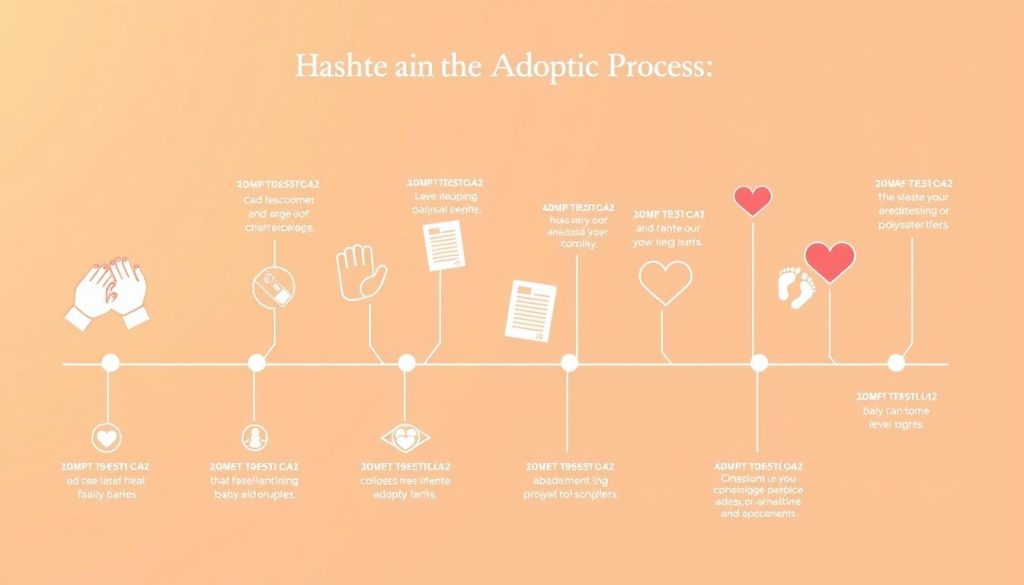Adoption lets LGBTQ couples become parents in a way that goes beyond biology. It’s about love and commitment. With laws changing and society becoming more accepting, more LGBTQ people are choosing adoption.
Agencies like American Adoptions are working hard to support LGBTQ couples. They make sure these couples get the same help and care as others. The Supreme Court’s 2015 decision helped make adoption rights for LGBTQ couples stronger.
Key Takeaways
- The support network for LGBTQ parents includes family, friends, and communities.
- Research shows no difference in child outcomes for those raised by LGBTQ parents.
- The gender identity of a transgender parent doesn’t affect a child’s development adversely.
- LGBTQ+ individuals increasingly turn to adoption as a viable path to parenthood.
- Federal adoption tax credits help offset the costs of adoption for LGBTQ families.
Understanding Adoption and Foster Care Options
Exploring parenthood through LGBTQ adoption rights means knowing the difference between foster care and adoption. There are many ways to adopt, from private agencies to the foster care system. Learning about these options helps you make a confident choice.

Different Types of Adoption
Adoptions fall into three main categories: independent, agency, and international. Independent adoptions involve direct contact between birth and adoptive parents. Agency adoptions use private or public agencies, each with its own process and costs.
Public adoptions through foster care are often cheaper. They may include financial help, especially for children with special needs.
| Type of Adoption | Description | Common Cost Range |
|---|---|---|
| Independent Adoption | Birth and adoptive parents arrange the adoption | $10,000 – $40,000 |
| Agency Adoption | Completion through a private or public agency | $20,000 – $45,000 |
| International Adoption | Adopting a child from another country | $25,000 – $50,000 |
| Foster Care Adoption | Adoption through foster care system | Little to no cost |
Importance of Foster Care
Foster care provides temporary homes for children who can’t live with their families. As of September 30, 2020, about 442,995 kids were in foster care. Many return home, but 117,000 are waiting for a permanent family.
Foster parents get help with basic needs like food and clothes. They must go through a detailed assessment to ensure they’re ready.
- Temporary Solution: Offers a safe, caring place for kids.
- Potential for Adoption: Many foster kids can be adopted, leading to a permanent home.
- Support Services: Foster kids get help with therapy, tutoring, and medical care.
Legal Considerations for LGBTQ Couples
Adoption for LGBTQ couples is possible in all 50 states. But, laws vary, and some agencies might discriminate. Most states protect LGBTQ adoption rights, but it’s important to know the specific laws.
Adoption lawyers or agencies help ensure you follow all legal steps. Knowing these details is key to finding a loving home for children in need.
The Adoption Process: An Overview
Adopting a child is a deep and life-changing journey. It involves many steps, different timelines, and challenges. Knowing the legal process, making arrangements, and facing common challenges can help LGBTQ couples on this path.
Steps Involved in Adoption
The journey starts with an orientation meeting. Here, you learn about your roles and the journey ahead. Then, you submit an application and go through a home study, which takes six to twelve months.
This period includes background checks, home visits, and interviews. Legal paperwork and matching with a birth parent are also part of domestic adoption. The Interstate Compact on the Placement of Children (ICPC) is needed for out-of-state adoptions, taking 8-14 days after documents are signed.
After the Post Placement Period, which lasts from 1 to 18 months, the adoption is finalized. A short hearing grants the child’s legal custody to the adoptive parents.
Timeline Expectations
The adoption timeline varies, from months to years. Setting realistic expectations and staying organized helps manage the wait. About 60% of U.S. adoptions are through private agencies, affecting the timeline and process.

Knowing average wait times and costs is key. The cost of adopting a baby through a domestic agency is $20,000 to $45,000. Discussing timing and cost with your agency is crucial.
| Adoption Step | Estimated Timeframe |
|---|---|
| Application and Orientation | 1-3 Months |
| Home Study | 6-12 Months |
| Matching Process | Varies |
| ICPC Process (if applicable) | 8-14 Days |
| Post Placement Period | 1-18 Months |
| Finalization Hearing | 10-30 Minutes |
Common Challenges
Adoption comes with challenges, especially for LGBTQ couples. The legal process can be complex, with different rules in each state. Thorough arrangements and early planning can help.
Societal prejudices can also be a challenge. Finding an LGBTQ-friendly adoption service is important for a supportive process. The emotional strain and long timelines highlight the need for a strong support network and professional guidance.
By understanding these steps and preparing for challenges, you can navigate the adoption journey. This brings you closer to welcoming a child into your loving family.
Same-Sex Couples: Navigating Legalities
Same-sex couples face unique challenges when adopting. It’s key to know about LGBTQ legal rights for a successful adoption journey.
Marriage and Adoption Rights
With same-sex marriage legal across the U.S., many adoption barriers are gone. Married same-sex couples have the same rights as heterosexual couples in adoption. But, it’s important to remember that state-specific adoption laws can still affect the process. Getting legal advice is often necessary.
Second-Parent Adoption
For unmarried partners, second-parent adoption is crucial. It lets a non-biological parent adopt, securing legal rights. While some states make it easy, others have tougher rules.

State-Specific Laws
Knowing your state’s state-specific adoption laws is vital for same-sex adoption. For example, Texas allows gay adoption but has specific steps like a home study. States like Mississippi, Wyoming, and Alaska have high adoption rates for same-sex couples. Understanding your state’s laws helps you navigate the legal side of adoption.
Choosing an Adoption Agency: What to Consider
Choosing the right adoption agency is crucial for future parents. You need to check if they are accredited, read reviews, and see if they support LGBTQ families. It’s also important to see if they match your needs. By looking at these factors, you can make a choice that helps your adoption journey succeed.
Accreditation and Reviews
Accreditation in adoption is key. U.S. laws say adoption agencies must have Hague Convention accreditation. Always check if an agency is licensed, as unlicensed ones offer less protection. Look for clear fees and contracts. Reviews from other families can also give you a good idea of an agency’s trustworthiness.
LGBTQ-Friendly Agencies
Finding an LGBTQ-friendly adoption agency is vital. Ask about their experience with LGBTQ adoptions and legal support. With more agencies supporting diverse families, it’s important to find one that fits your values and offers the right support.
Questions to Ask Potential Agencies
When looking at adoption agencies, ask important questions. Some questions include:
- What is the agency’s licensing and accreditation status?
- What support services are available for LGBTQ families?
- Can you provide detailed fee structures and timelines?
- How experienced is the staff in handling diverse adoptions?
- What pre- and post-adoption services do you offer?
- How do you mitigate adoption disruption risks?
These questions help you understand if the agency can support your journey well.
Preparing for Parenthood: Emotional and Practical Tips
Starting your journey as adoptive parents requires both emotional and practical steps. You’ll need to build a support network, understand the financial side, and learn about the unique challenges of LGBTQ parenting. Let’s explore these key areas to make your transition smoother.
Building a Support Network
Creating a support network is key for adoptive and foster parents. Connecting with others who face similar experiences can offer both emotional and practical help.
- Join local and online support groups for foster and adoptive parents.
- Regularly check in with family and friends to share any challenges.
- Use community resources that support LGBTQ families.
These connections can help you deal with the emotional side of fostering. They provide a sense of unity and understanding.
Financial Considerations
Understanding the financial side of adoption is crucial. The process can be costly, covering home studies, legal fees, and travel. It’s important to plan well.
| Expense | Estimated Cost |
|---|---|
| Home Study | $1,000-$3,000 |
| Legal Fees | $2,500-$7,000 |
| Travel Costs | $1,500-$3,500 |
Many employers also offer support for foster and adoptive parents. This can include paid leave and reimbursement programs. It’s worth checking with your employer to see what help is available.
Education and Training Resources
Education is key for adoptive parents to handle child-rearing challenges. Comprehensive training and resources can prepare you for your child’s unique needs.
“As a future adoptive parent, continuous learning is crucial. Access preservice training sessions, read expert articles, and attend workshops to enrich your knowledge.”
Being well-prepared through these resources empowers you to care for your child. Always strive to improve your preparation, knowing that education is a lifelong journey.
By focusing on building support networks, understanding financial planning for adoption, and using education for adoptive parents, you’ll be ready for the rewarding journey of parenthood.
Post-Adoption Support for LGBTQ Families
Support after adoption is key for LGBTQ families’ happiness. You might face challenges or want to find a community. Luckily, many resources are here to help you succeed in your family life.
Access to Resources
First, learn about the post-adoption resources out there. You’ll find services like education and parenting tips. There are also groups and therapy for tough times.
Community Organizations
Many groups offer LGBTQ community support. The Human Rights Campaign and Family Equality Council are great places to start. They help you find local groups and resources for LGBTQ adoptive parents. In California, Lilliput and Aspiranet provide even more support.
Mental Health Support
Getting help for mental health for adoptive parents is vital. Look for therapists who know about adoption. They should have experience and a good track record with adoption cases. Mental health support can make a big difference, helping you and your child feel supported.
Celebrating Family Diversity: Sharing Your Journey
Being an LGBTQ family means celebrating your unique path. This enriches your family life and helps the community. By sharing your story, you show the beauty of different family structures.
This encourages others to support and celebrate diversity too.
Creating an Inclusive Family Narrative
Creating a story that includes everyone is key for your child’s self-esteem. Embracing cultural differences through adoption makes your child’s life richer. It also helps society become more open.
By celebrating your child’s culture and keeping ties to their roots, you give them a well-rounded upbringing. This helps them feel good about who they are.
Connecting with Other LGBTQ Families
Connecting with other LGBTQ families is vital. It creates a supportive network that helps you face challenges. Joining community groups and attending LGBTQ family events strengthens these bonds.
Sharing experiences and advice helps everyone overcome obstacles together. This sense of belonging and solidarity is crucial for families on similar journeys.
Advocacy and Awareness Efforts
Being part of adoption advocacy is important for fairness and equality. Your family’s love and compassion help make the world more inclusive. By joining advocacy efforts and sharing your story, you help break down barriers.
This promotes a society where all families are treated equally, no matter their structure.
By celebrating your family’s diversity, you not only strengthen your bonds but also inspire and educate others. This paves the way for a more inclusive future.
FAQ
What are the different types of adoption available to LGBTQ couples?
Why is foster care important for LGBTQ couples?
What legal considerations should LGBTQ couples be aware of when adopting?
What are the key steps involved in the adoption process?
How long does the adoption process typically take?
What common challenges might LGBTQ couples face during the adoption process?
How do marriage and adoption rights intersect for same-sex couples?
What is second-parent adoption, and when is it necessary?
How can state-specific laws impact the adoption process for LGBTQ couples?
What should LGBTQ couples consider when choosing an adoption agency?
How can you build an effective emotional support network as an LGBTQ adoptive parent?
What financial considerations should LGBTQ couples prepare for in the adoption process?
Where can LGBTQ parents find educational and training resources?
What types of post-adoption support are available for LGBTQ families?
How can LGBTQ families create an inclusive family narrative?
How can LGBTQ adoptive parents connect with other LGBTQ families?
What advocacy and awareness efforts can LGBTQ families participate in?
This post contains affiliate links. If you click on a link and make a purchase, I may earn a small commission — at no extra cost to you. Thank you for supporting this blog and helping me keep the patterns free! Read the full Affiliate Disclosure & Transparency.
